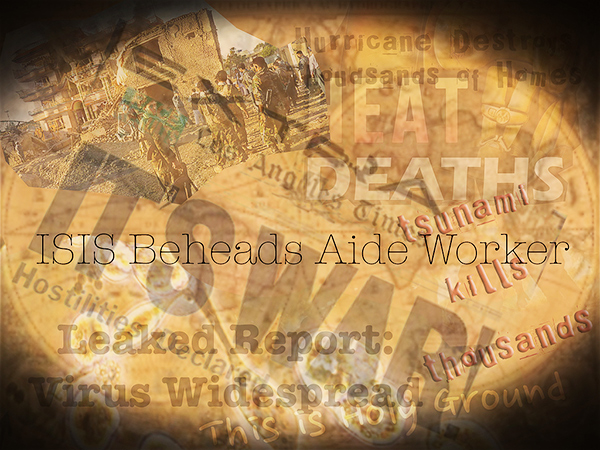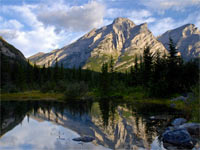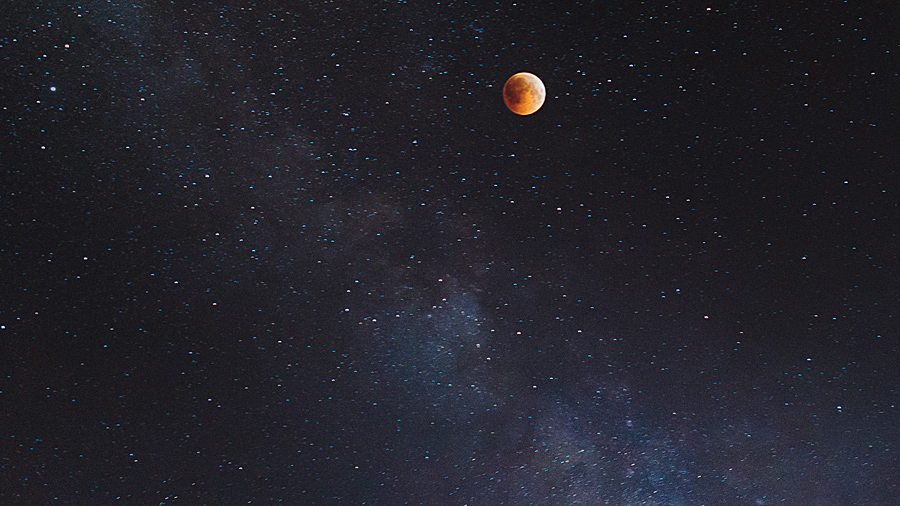Special Note:
This is the third in a series of posts about God's value of woman and The Creator's plan for people in the kingdom of God to restore his original intent through the life of the church.
Chaos.
Hatred.
War.
Bloodshed.
Crime.
Abuse.
Terminal illnesses.
Poverty.
Disaster-producing weather.
And, the list could go on and on!
We know deep in our bones that something is broken and deeply flawed with our world. The breathtaking beauty, symmetry, and diversity of God's creation reminds us, however, of God's creative goodness behind the glory of our magnificent universe — although, we acknowledge with deep regret, this breathtaking beauty exists alongside a malevolence and hostility that shows itself in violent eruptions throughout our world, its creatures, and its systems. Though made with beauty and order, our universe is marred and scarred.
Paul's words, written to followers of Jesus in Rome, captured this primal disconnect that we still feel in our souls:
For the creation waits in eager expectation for the children of God to be revealed. For the creation was subjected to frustration, not by its own choice, but by the will of the one who subjected it, in hope that the creation itself will be liberated from its bondage to decay and brought into the freedom and glory of the children of God. We know that the whole creation has been groaning as in the pains of childbirth right up to the present time (Romans 8:19-22).
This brokenness has impacted the way we treat each other as fellow humans. It has most certainly marred the way men and women have dealt with each other. The eruption of anguish in the "Me Too!" movement, the stain of child abuse, the painful truth of abortion, the ugliness of ethnic/cultural/racial hatred, and the pervasiveness of poverty all remind of this systemic brokenness of God's original created beauty.
This anguish was not what God wanted for us. We live after "The Long Fall"[NOTE] and in the aftermath mess of sinful rebellion. The divine goodness of our Creator has been ripped apart by human selfishness and suspicion, leaving behind its insidious and poisonous residues. What God had carefully designed to be beautiful is now fractured and distorted. The connection between complements, both created of equal value in the image of the Creator, is now fractured. The relationship between man and woman has become a dance of grace now often marred by deception, sin, blame, hiding, abuse, deceit, and regret.

As Jesus' disciples, his spiritual family, we live in the aftermath of "The Long Fall." Yet we live in this aftermath to be salt to counteract the world's decay and light to help lead the world out of its darkness (Matthew 5:13-16). We are called to be the place and people where Jesus' kingdom values are displayed and made graciously real. Jesus taught us to pray:
Our Father in heaven, hallowed be your name, your kingdom come, your will be done, on earth as it is in heaven (Matthew 6:9-10).
In praying this prayer, Jesus' disciples are saying, "God our world is broken and we desperately want to see your kingdom come. We want to partner with you to bring your full and redemptive grace to our world and restore your original divine intent to all that is broken." By praying this prayer, we are also accepting our role in being partners with our Father's work at redeeming the world to this original creative grace and divine intent. That is our role as disciples in the Father's dawning kingdom. That is our promise. That is our role in every relationship Jesus provides us.
Pentecost — the feast fifty days after the Passover when Jesus was crucified — became the moment that the Holy Spirit relit God's divine spark of creative and restorative grace. Rooted in Luke's account of this important moment in history, the Holy Spirit gives us a glimpse of our role in this re-creation, this dawning new kingdom of grace, beauty, and restoration. We are to be Jesus' people, participants in the re-creation of God's divine intent.
At Pentecost, several results of "The Long Fall" were reversed. In those "last days," Babel and the confusion of languages and division of people (Genesis 11:1-9) were reversed as each person heard the message of Jesus in his or her own language (Acts 2:5-18).  However, far more than just the separation of language was mended by this flash of divine grace. Young and old were united in dreaming dreams and having visions. Both men and women prophesy. Not just one nation or people but "everyone who calls on the name of the Lord" can be saved (Acts 2:21), forgiven, given the Spirit, and added to the people of God (Acts 2:38-41, 47).
However, far more than just the separation of language was mended by this flash of divine grace. Young and old were united in dreaming dreams and having visions. Both men and women prophesy. Not just one nation or people but "everyone who calls on the name of the Lord" can be saved (Acts 2:21), forgiven, given the Spirit, and added to the people of God (Acts 2:38-41, 47).
These promises, these kingdom yearnings, are not just for those at Pentecost. All whom the Lord calls, even those who are far off, will join with this original group at Pentecost. They will share in this new creation through believing in Jesus, by sharing in baptism, and in receiving the gift of the Spirit (Acts 2:38-41). Built into the fabric of Pentecost, this birth of Jesus' church, is the promise of the restoration of a people who live out their Creator's intent in their kingdom culture.

With Pentecost, God began the work of re-creating his new humanity. Paul talked about no longer viewing anyone from a worldly point of view because he had experienced this new creation:
For Christ's love compels us, because we are convinced that one died for all, and therefore all died. And he died for all, that those who live should no longer live for themselves but for him who died for them and was raised again.So from now on, we regard no one from a worldly point of view. Though we once regarded Christ in this way, we do so no longer. Therefore, if anyone is in Christ, the new creation has come: The old has gone, the new is here! (2 Corinthians 5:14-17).
The implications of Pentecost and this new creation are astounding. What we see in glimpses during Jesus' ministry are now to be breaking into our world through his people who are re-created by the Holy Spirit to do his good work (Ephesians 2:10) of building his kingdom family. This kingdom family is the place where the Creator's original intent for all things, especially for valuing men and women as the Father's precious creations, is experienced.
Jesus' disciples are called to live and create a different world than the broken one they find themselves inhabiting — "a new creation has come" Paul could declare (2 Corinthians 5:17). Their lives and their fellowship are to beckon the world to this new place and people of grace. It is through Jesus' kingdom, his place and people of grace, that the barriers separating people are torn down, and a new humanity is created (Ephesians 2:11-16).
This place of grace is so revolutionary that it captures the attention of heavenly beings as well as worldly authorities:
His intent was that the manifold wisdom of God should be made known to the rulers and authorities of the heavenly realms, according to his eternal purpose that he accomplished in Christ Jesus our Lord (Ephesians 3:10-11).

The apostle Paul had a way of speaking of this divine intent that was to be restored. He used the same language of Pentecost — faith in Jesus, baptism, and the work and personal indwelling of the Holy Spirit — to talk about this place of re-creation and restoration of the Creator's intent. While found elsewhere in his letters, Paul's fullest declaration of it is as breathtaking as it is comprehensive:
For you are all children of God through faith in Christ Jesus. And all who have been united with Christ in baptism have put on Christ, like putting on new clothes. There is no longer Jew or Gentile, slave or free, male and female. For you are all one in Christ Jesus. ... And because we are his children, God has sent the Spirit of his Son into our hearts, prompting us to call out, "Abba, Father." (Galatians 3:26-29; Galatians 4:6).
What this means for us is extremely important to us as Jesus' disciples. We must not miss it. So, let's re-emphasize a few key points for this week:
"The Long Fall" has left us and all creation in a mess of chaos, division, suspicion, blame, hate, rivalry, abuse, and sin — although the beauty and diversity of creation still can capture our hearts and remind us of the Creator's desire to bring us beauty, grace, and life.
Pentecost was the beginning of this new kingdom breaking in on the world through Jesus' disciples — the church — where the differences and barriers of language, culture, race, class, and gender were broken so Jesus' followers could restore relationships to God's creative intent.
Paul proclaimed that this new world was to be demonstrated by Jesus' disciples as the divisions and barriers that separate humankind would fall as a new humanity is created in Christ and the ultimate value of each person is restored to God's creative intent.
Of course, understanding God's design for the church to lead the way in breaking down barriers that separate humankind is one thing; flawed human disciples living it out are another:
How do we live more redemptively on the front edge of societal redemption and not on the defensive end, reacting to everything new that we feel might threaten us?
How do we begin with God's purpose of Pentecost and his kingdom people restoring his creative intent instead of a few proof-texted passages that support living as the church as we know it?
How do we work redemptively as salt and light and not become co-opted with the world and culture's agenda instead of God's intent?
By the Lord's grace, we hope to look deeper into these questions and others in future weeks.

These are all thoughts to ponder and matters for our prayer time as we ask the Spirit to enlighten and transform us as we pray for God's kingdom to come and his will to be done in us as it is in heaven.
[NOTE] Throughout this post, the phrase "The Long Fall" refers to the tragic results of sin we see unfolding in Genesis chapters 3-11. These chapters talk about more than just the Fall of Adam and Eve; they also tell us how sin infected the whole fabric of creation and brought about divisions, barriers, and hostilities to a once perfectly created universe.










Reader Comments
Archived Facebook Comments